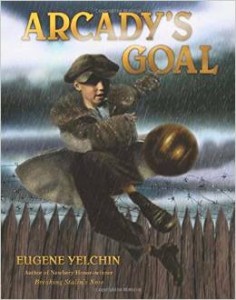Arcady’s Goal by Eugene Yelchin. Henry Holt, 2014. 234 pages.
Reading Level: Middle Grades, ages 8-10
Maturity Level: 3 (ages 8-10) and up
Bottom Line: Arcady’s Goal exposes the fear and bleakness of Stalinist Russia through the eyes of a 10-year-old soccer prodigy.
Arcady is routinely called a “criminal” by his keepers though he has committed no crime. He lives in a compound—basically a prison—where he’s fed starvation rations, receives no education, and must fend for himself among other boys in similar circumstances. They are “children of the enemies of the people,” whose parents were accused of subversion often before they had done anything, then shipped off to prison camps or summarily executed. The kids aren’t buying it: Ask what our parents have done, and each one of us would say our mom and dad are good. Arcady is a few steps ahead of Sasha, the protagonist in Breaking Stalin’s Nose; he doesn’t idolize Comrade Stalin and understands that apparatchiks like “Butterball,” the director, are not to be trusted though you can occasionally make deals with them. Arcady’s world is overturned when the inspectors arrive: two of them are burly, jovial party members in big coats, but the third looks like an impoverished schoolteacher. They all exclaim over Arcady’s soccer skills, but none offer him a place on the Red Army soccer team. However, he receives the surprise of his young life when the schoolteacher returns the next day and offers to adopt him. This is Ivan Ivanych, a confusing figure of diffidence and bravado, who also claims to be a soccer coach.
The story, a fast read, is simple and nowhere near as powerful as Breaking Stalin’s Nose, but it’s more accessible to children for the same reason. Arcady is an appealing mix of tough guy and naïf who feels sincere affection stealing into his determination to get ahead. Ivan Ivanych is more complex, but layers of his personality will peel away in the course of the story. The real punch in this book is in the illustrations: comrade Butterball, for example, leering from on high at his small victims, who are later seen as wistful eyes peering out from behind the slatted windows when Arcady leaves the compound. The author/illustrator includes a picture of his own father, captain of the Red Army Soccer Team, and explains more about the evils of Stalinism in the author’s note. But the reader can get a sense of that evil from the story alone.
Cautions: none
Overall Value: 4 (out of 5)
- Moral/worldview value: 3.75
- Artistic value: 4.5
Categories: Middle Grades, Historical Fiction, Multicultural, Read-Alouds, Character Values, Life Issues
Cover image from Amazon
Support our writers and help keep Redeemed Reader ad-free by joining the Redeemed Reader Fellowship.
Stay Up to Date!
Get the information you need to make wise choices about books for your children and teens.
Our weekly newsletter includes our latest reviews, related links from around the web, a featured book list, book trivia, and more. We never sell your information. You may unsubscribe at any time.
We'd love to hear from you!
Our comments are now limited to our members (both Silver and Golden Key). Members, you just need to log in with your normal log-in credentials!
Not a member yet? You can join the Silver Key ($2.99/month) for a free 2-week trial. Cancel at any time. Find out more about membership here.

